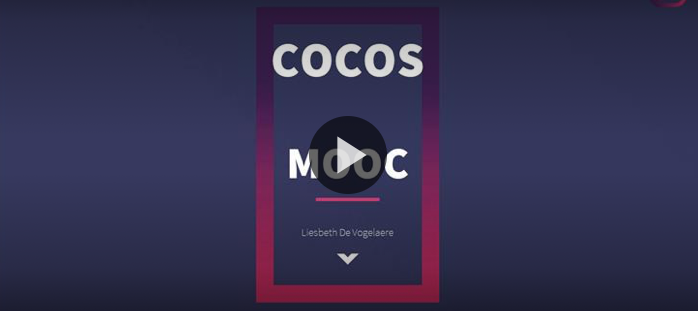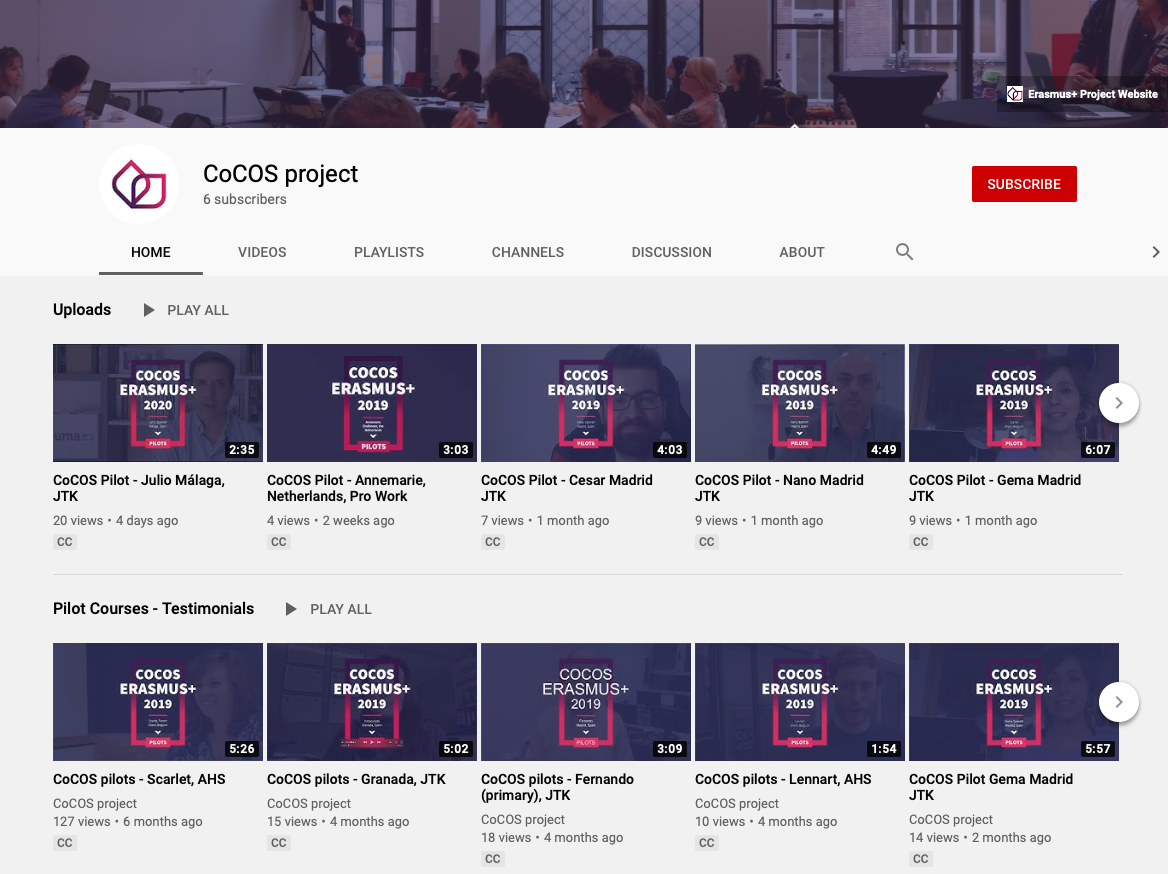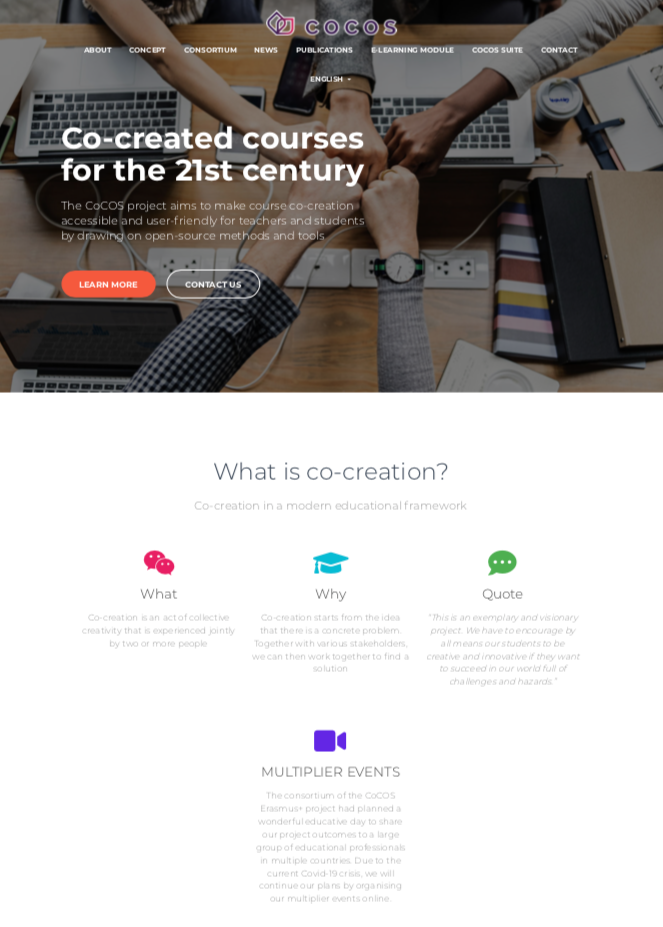This resource will give you an overview of what was developed in IO6 as part of the CoCOS project. The section introduction clarifies the different objectives that were suggested in this outcome. The second section will tell you a bit more about a Massive Online Open Course that was developed and how you can access it to get access to a great bundle of valuable information if you're interested in the co-creation of educational resources. Section 3 directs you to our YouTube-channel where you can find testimonials from educators and students that participated in CoCOS pilots. The 4th and final section gives an overview of what you can find on the projects' website which was part of IO6.
Enjoy and let's co-create!

Co-creation Using Open Source Methods and Tools
CoCOS - Community-based co-creation website and MOOC
CoCOS Community-based co-creation website and MOOC, May 2020
Ghent | Sofia | Velenje| Madrid |Burgh-Haamstede
Legal Disclaimer
The CoCOS project has been funded with support from the European Commission.
This publication reflects the views only of the authors, and the Commission cannot be held responsible for any use which may be made of the information contained therein.
License
CoCOS is encouraging the free access and use of education-related materials. This work is licensed under a Creative Commons Attribution-NonCommercial-ShareAlike 4.0 International License. (CC BY-NC-SA 4.0)
You are free to:
Share — copy and redistribute the material in any medium or format
Adapt — remix, transform, and build upon the material
Under the following terms:
Attribution — You must give appropriate credit, provide a link to the license, and indicate if changes were made. You may do so in any reasonable manner, but not in any way that suggests the licensor endorses you or your use.
NonCommercial — You may not use the material for commercial purposes.
ShareAlike — If you remix, transform, or build upon the material, you must distribute your contributions under the same license as the original.
No additional restrictions — You may not apply legal terms or technological measures that legally restrict others from doing anything the license permits.
The intellectual output contained in O6 consist of three components.
O6.1 Online co-creation training resources
Part of the CoCOS project is a MOOC, a massive open online course. That means the user can take part for free. In the MOOC we offer a mix of theory and practice, combines with examples, tools and interviews of experienced users who offer their personal tips and experiences. A neat package that we hope will inspire you to set up your own co-creation project.
This module forms the preparatory, online component in a flipped classroom package, along with the hands-on F2F professionalisation training (IO3). The online training resources will convey the conceptual framework developed in IO1 and a practical introduction to the online co-creation environment developed in IO2. It hence forms the necessary connection between IO1, IO2 and IO3.
O6.2 Knowledge clips and user stories
During the pilot courses, knowledge clips were created to illustrate the diverse pilot settings and to provide a first-person perspective. These user stories are available via the community-based website. Tutorials and FAQ were also created in order to facilitate and scaffold educators who want to start their own co-creation trajectory.
O6.3 Community-based website
Throughout the project, a website was maintained to communicate the goal, results and materials developed during the CoCOS project. All other intellectual outputs have been collected on this website. In addition, the site was e constructed in such a way that it interconnects the various outputs in a meaningful way.
__
All materials developed in O6 were translated into the local languages of the partners within the CoCOS consortium.
Online co-creation training resources: CoCOS MOOC
The MOOC consists of 7 modules. In the first module we explore why you should use co-creation. We start with a bird's eye view of co-creation. Starting from the conceptual framework we discuss how we define it and what types of co-creation exist. To illustrate this we have included a podcast with Ruben Verborgh, professor in web development at Gent University. He has used co-creation in his classes for several years and offers his vision on co-creation of content in an educational context. Also important is the notion of openness. Not only an open mindset is needed but also the use of open software. That's why the MOOC is available through Moodle, an open LMS Learning Management System) allowing among other functionality, open access to contents. The CoCOS MOOC is accessible for the general public using Moodle “Guest Access”. The user just needs to browse into any of the MOOC Modules to be identified as a “Guest”.
In module 2 we discuss the various types of co-creation you can implement in your course. We offer some easy ways and tools. The module kicks off with an interview with Stefaan Cottenier, professor in computational materials physics at Gent University. He experimented with co-creation in class and online. Various online tools are available to help you. Especially relevant is the CoCOS suite that was created especially for this project.
In module 3, 4 and 5 we introduce the different players in the co-creation process. Module 3 deals with the teacher. What obstacles can occur? Our podcast guest is Clio Janssens (Arteveldehogeschool) who has been helping her colleagues in their co-creation process. She offers her advice on a couple of topics. How can you motivate your group of students or experts to contribute to your course content? What are the benefits of implementing co-creation on a small or a longer time-scale?
In module 4 we discuss how your network can help you. Who might this be? A colleague who has tried something in the realm of co-creation. A future or former student of your course. An expert from the field. How do they feel about co-creation? And module 5 offers the point of view of the some of the students that participated in some of our trials. What can we learn from their experiences and what obstacles did they encounter?
In module 6 we introduce you to a framework for a didactical approach towards co-creation. We propose to apply technological pedagogical content knowledge (TPACK) through the process of design thinking. In module 7 we recap the MOOC course by discussing the lessons learned. What were the pitfalls and advantages our test audience encountered.
This course will give you a lot of practical tips and examples that will help you get started with the co-creation of your own course.
Access to the MOOC
The MOOC is open and accessible for everyone via https://my.cocos.education

All resources in the MOOC are available in the following languages:
- Bulgarian
- English
- Dutch
- Slovenian
- Spanish
MOOC Overview
A short video that gives you an overview about the available materials was prepared and is available via this link.

Throughout the different pilots that were organised (see IO4) the consortium recorded several testimonials. In these testimonials educators and students share their experiences in how CoCOS changed the way they've been teaching so far.
YouTube-channel
All video's are available on the projects' YouTube channel.

The website
Throughout the project, a website was maintained to communicate the goal, results and materials developed during the CoCOS project. All other intellectual outputs were collected on this website. In addition, the site was constructed in such a way that it interconnects the various outputs in a meaningful way.

Online multiplier event
Due to COVID19 measures, the multiplier event was organised via an online format. All resources, mainly video's, remain available on the projects's website via the following link: https://www.cocos.education/multiplier-events/
Intellectual outcomes
All reports, regarding the intellectual outcomes that were delivered during the project are available in an open format on the projects's website via a catalogue that was built in a Pressbooks installation. Alle publications can be accessed via the following link: https://publications.cocos.education
Access to the website
All other information about the project, the consortium, newsletters and special events, access to the MOOC and the CoCOS Suite are all available via the menu items on the website.

All items on the website are available in the following languages:
- Bulgarian
- English
- Dutch
- Slovenian
- Spanish
The website can be accessed via the following link: https://www.cocos.education